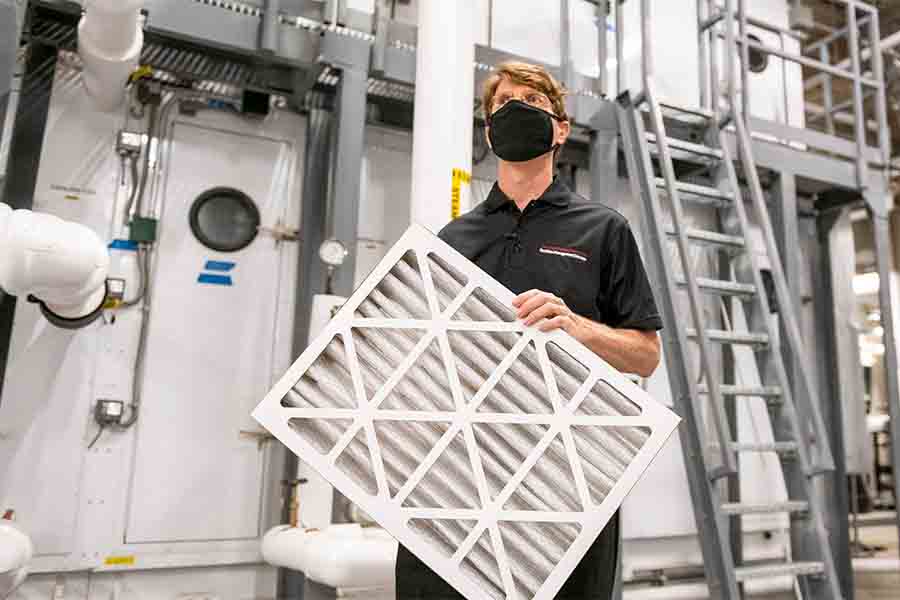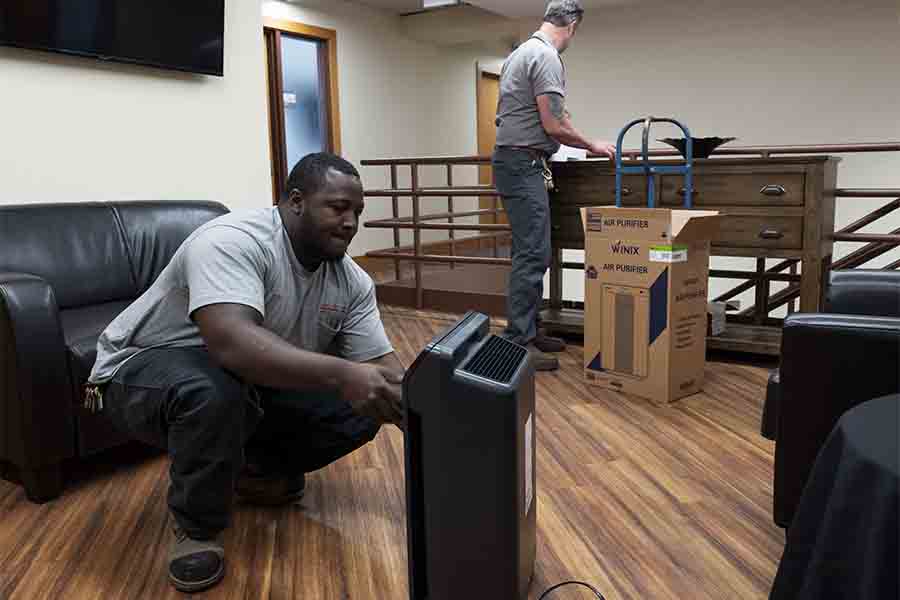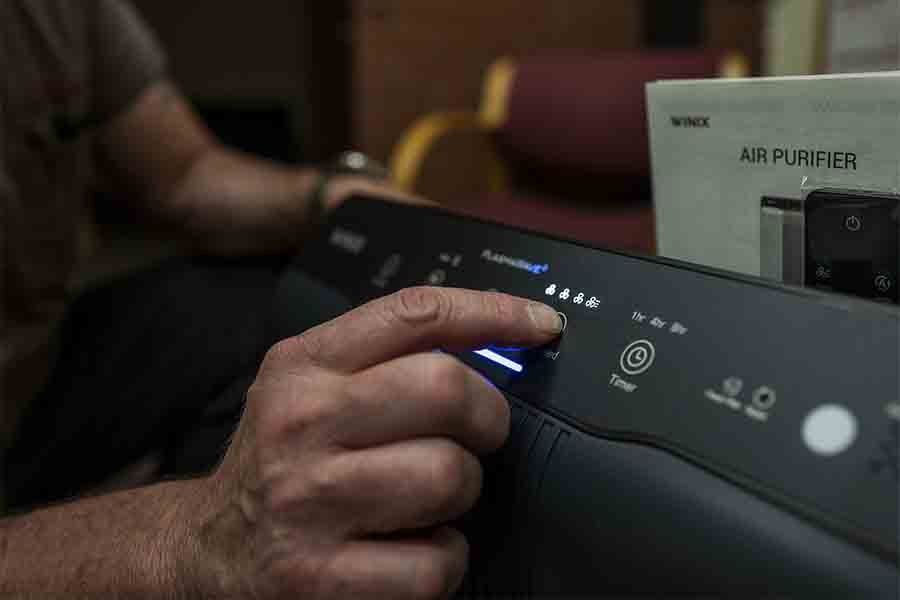Breathing Easier
HVAC enhancements carry benefits beyond COVID-19
By Kelly Saavedra
The campus community can breathe a little easier knowing the enhancements Carnegie Mellon University has made to its heating, ventilating and air conditioning (HVAC) systems over the past year and a half carry benefits beyond mitigating the spread of COVID-19.
“CMU was well ahead of the curve due to its 20-year commitment to building green buildings, of which indoor air quality is a part. Our past investments in ventilation and filtration were very beneficial as we entered the pandemic,” said University Engineer Steve Guenther, assistant vice president of Facilities Management and Campus Services (FMCS).
As early as January 2020, the university was evaluating options for enhancing its HVAC systems to help combat the virus, and has since implemented accelerated maintenance programs, modified automation logic, increased operating hours, maximized air ventilation, verified high filtration and deployed portable HEPA air purifiers.
Advanced technologies were piloted in seven buildings, including new ultraviolet airflow disinfection and needlepoint bipolar ionization systems. The technologies have proven effective in eliminating the growth of bacteria, mold and spores, and in controlling the spread of airborne viruses.
“Based on the positive results with the seven-building pilot, we expanded in additional buildings with a focus on instructional and large gathering spaces,” Guenther said. “A total of 24 buildings have these technologies to enhance HVAC systems.”
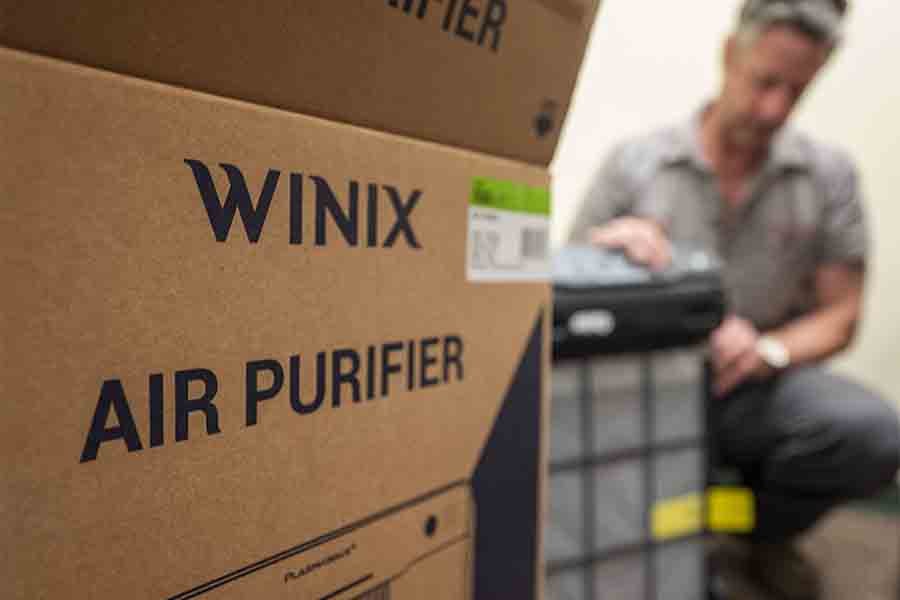
For the upcoming Fall 2021 semester, CMU is deploying up to an additional 1,000 portable HEPA (high-efficiency particulate absorbing) air purifiers in spaces around campus to assist in reducing the number of infectious particulates and indoor pollutants in the air. A recent study by the Centers for Disease Control and Prevention (CDC) showed adding portable HEPA cleaners to ventilation systems reduces the number of airborne infectious particles. If you are interested in implementing a portable air cleaner in your workspace, contact Fixit@cmu.edu.
“Even from an operations perspective, our certified green cleaning program works to reduce indoor pollutants and particulates. So, all these steps continue to build on a university focus that goes back years on improving indoor environmental air quality,” Guenther said.
Indoor pollutants and particulates can come from many sources, such as:
- people smoking tobacco near building entrances;
- building materials such as paints, coatings, adhesives and sealants;
- furniture that may emit volatile organic compounds;
- combustion processes in HVAC equipment or stoves;
- vehicles in nearby garages or entrances;
- mold;
- pollutants from processes used in labs or tracked in on people’s shoes; and
- respiration, which increases carbon dioxide levels and may introduce germs.
“We did a whole lot of due diligence in terms of selecting which enhancements we were going to pursue,” Guenther said. “Many products have hit the marketplace before and during the pandemic that make all kinds of unsubstantiated claims and promises. In many cases, what they don’t say is that those products can also create unintended negative consequences.”
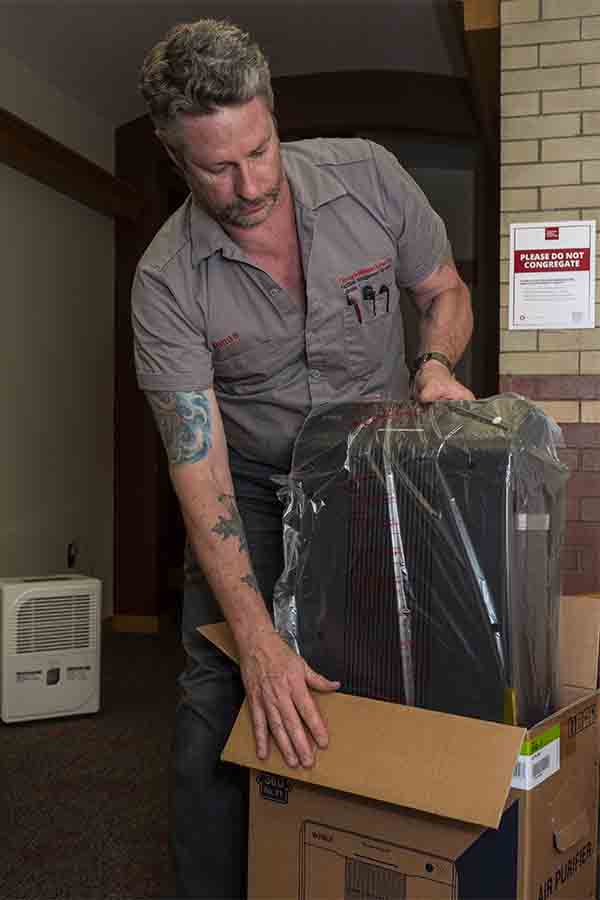
To avoid creating problems, Guenther and his team benefited from access to CMU faculty who specialize in atmospheric chemistry. The research faculty provided input and scientific expertise to ensure that the mitigations and enhancements selected would be effective and not harmful. The ability to receive candid feedback and cautionary advice was critical to verify the manufacturer’s independent research and testing.
“In essence, we knew the best available options and did exhaustive due diligence on what we were buying,” said Don Coffelt, associate vice president for FMCS.
But they didn’t stop there. They took it a step further and did their own field testing to verify the manufacturer’s claims. Graduate students from the Department of Chemical Engineering and Mellon College of Science took actual readings in the spaces where the enhancements were installed. Readings were taken with the enhancements turned off, and then taken again with them turned on.
“Those readings confirmed the enhancements did make a positive improvement in the indoor air quality of those spaces,” Guenther said.
Among the benefits of improving indoor air quality are easier breathing, balanced humidity, improved mood and productivity, reduced chances of premature disease, reduced energy costs and a workforce that can focus on being creative and innovative.
Guenther credits creativity and innovation for putting CMU in a position to create safer spaces as early as they did.
“Where we were seeing shortages of supplies like hand sanitizer and toilet paper, there were similar shortages in equipment used to improve air quality. But we were at the front of the line, and it put the university in a place where we could create safer spaces, and not only for people sitting in a classroom.
“In many of our buildings, those same HVAC systems that serve the classrooms also serve adjacent offices and corridors and conference rooms," Guenther said. "And so, in many cases, we were able to do a whole building approach. So, there are benefits to everybody."
Departments should continue to work with their facility coordinators if they have any questions about the HVAC systems serving their space. FMCS personnel are working directly with all facility coordinators to answer questions quickly and efficiently.
